
Transcription
HARLAN RICHARDS
May 31, 2012
"One Is Too Many"
On May 21, 2012, USA Today reported on a study done by two universities which "identified 873 faulty convictions in the past 23 years that have been recognized by prosecutors, judges, or governors."
Scott Burns, executive director of the National District Attorneys Association, was quoted as saying: "Exonerations 'give the gross perception that there is a serious problem with wrongful convictions in this country, and it just not the case.'" The title to this blog is also a quote from Mr. Burns.
I have no idea what goes on in the other 49 states, but Wisconsin has created policies that make it difficult, often impossible, for wrongly convicted defendants to get exonerated.
I was convicted of murder in 1984 based on the knowing use of perjured testimony along with other prosecutorial misconduct. I lost my direct appeal and knew that my best chance of being vindicated lie in obtaining access to the prosecutor's file to get the evidence I needed to prove my claims.
At that time prisoners had access to the Wisconsin Open Access to Records Law (ORL) to obtain public records. I used that law to request a copy of the prosecutor's file. The district attorney refused to even respond to my request and so I initiated a mandamus action to force him to comply.
I won and the court ordered him to turn over the file to me. He again refused and filed an appeal. I won the appeal and he was again ordered to turn over the file. He sought review by the state supreme court which agreed to hear the case.
The supreme court overturned 20 years of prior case law to deny me access to the evidence I needed to prove I was wrongly convicted of murder, carving out an unprecedented exception to the ORL for prosecutorial files. They wanted to ensure a wrongly convicted defendant would never be able to access a closed prosecutorial file to challenge a conviction. See State ex rel Richards v Foust, 165 Wis. 2d 429, 477 N.W. 2d 608 (1991).
Since I already had some of the evidence I needed to raise some of the issues I filed a motion for post-conviction relief using what I did have. For instance, the state, in collusion with my attorney, withheld from the jury evidence of the 20 year history of my "victim" engaging in unprovoked attacks on people he didn't know.
I testified that he sucker-punched me when I offered to shake hands with him and in the ensuing fight I stabbed him in self-defense. The prosecutor allowed her witnesses to lie and claim I started the fight - hwich in turn prevented me from asserting the right of self-defense - and guaranteed my conviction for murder. Even with that, the jury was lawfully required to consider whether the murder conviction should have been reduced to manslaughter because I had believed my actions were justified at the time of the fight. But the judge issued jury instructions which misstated the law to prevent that as well.
I raised these and other issues and the trial court stayed my motion pending the outcome of State v Escalona-Naranjo, 185 Wis. 2d 168, 517 N.W. 2d 157 (1994).
In Escalona, the state supreme court again overturned 20 years of prior case law and held that any defendant who knew of the issues at the time of the direct appeal and did not raise them was forever barred from raising those issues. This new standard was applied retroactively to all convicted defendants so I was denied relief even though I was not guilty of murder and did not get a fair trial.
Shortly after this Bill Clinton signed the anti-terrorism and death penalty act which restricted access to federal habeas corpus for prisoners convicted in state courts. It made it impossible to win a federal habeas corpus action, once considered the most effective means of reversing erroneous convictions.
When DNA testing became widely available the University of WIsconsin Lawy School in Madison, WI created the Innocence Project to get innocent people out of prison. However, the person must not have committed the action upon which the conviction was based and there must be DNA evidence that wasn't tested. Anyone convicted based on prosecutorial misconduct, faulty jury instructions, knowing use of perjury, etc., could not obtain any assistance from the Innocence Project.
Based on my personal experience with wrongful conviction, I would speculate that there are many innocent people in Wisconsin prisons who have no chance of obtaining release or vindication. The court system has knowingly and intentionally created a judicial system designed to keep innocent people in prison.
With few exceptions, the only reason anyone gets exonerated in Wisconsin is because DNA evidence is irrefutable - the courts are forced to grant relief or openly admit they are keeping innocent people in prison. In all other cases, such as mine, prisoners end up serving the entire sentence based on a conviction for which they are not guilty. As a side note, any prisoner who does not admit guilty and express remorse at a parole hearing has no chance of release on praole.
Mr. Burns gave the reporter some nice quotes to put in his article but the truth is that prosecutors will do anything necessary to gain a conviction regardless of guilt or innocence. Once that conviction is obtained, only an Act of God will get an innocent person released from prison. And those are few and far between.
Other posts by this author
|
2021 jun 25
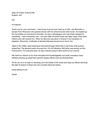
|
2021 may 25
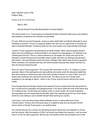
|
2021 apr 23
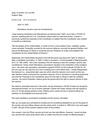
|
2021 feb 19
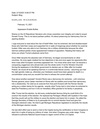
|
2021 feb 17
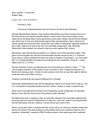
|
2021 feb 15
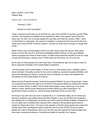
|
More... |
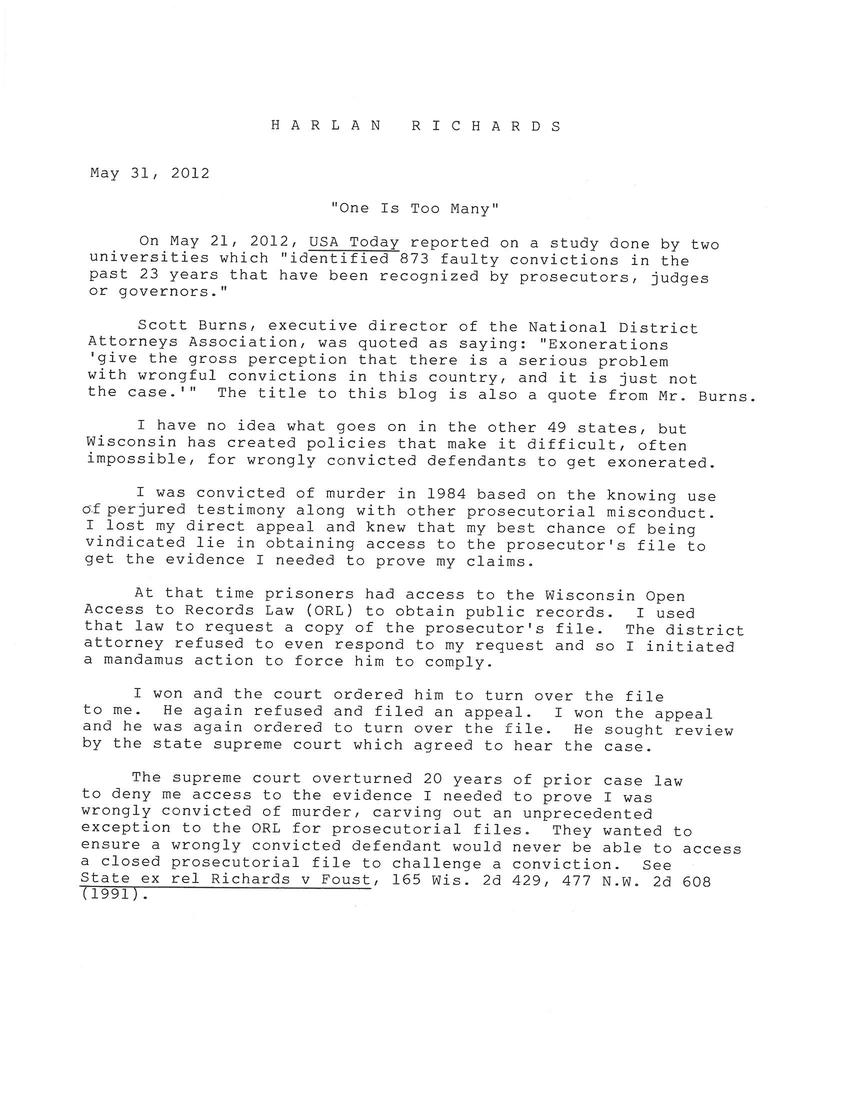
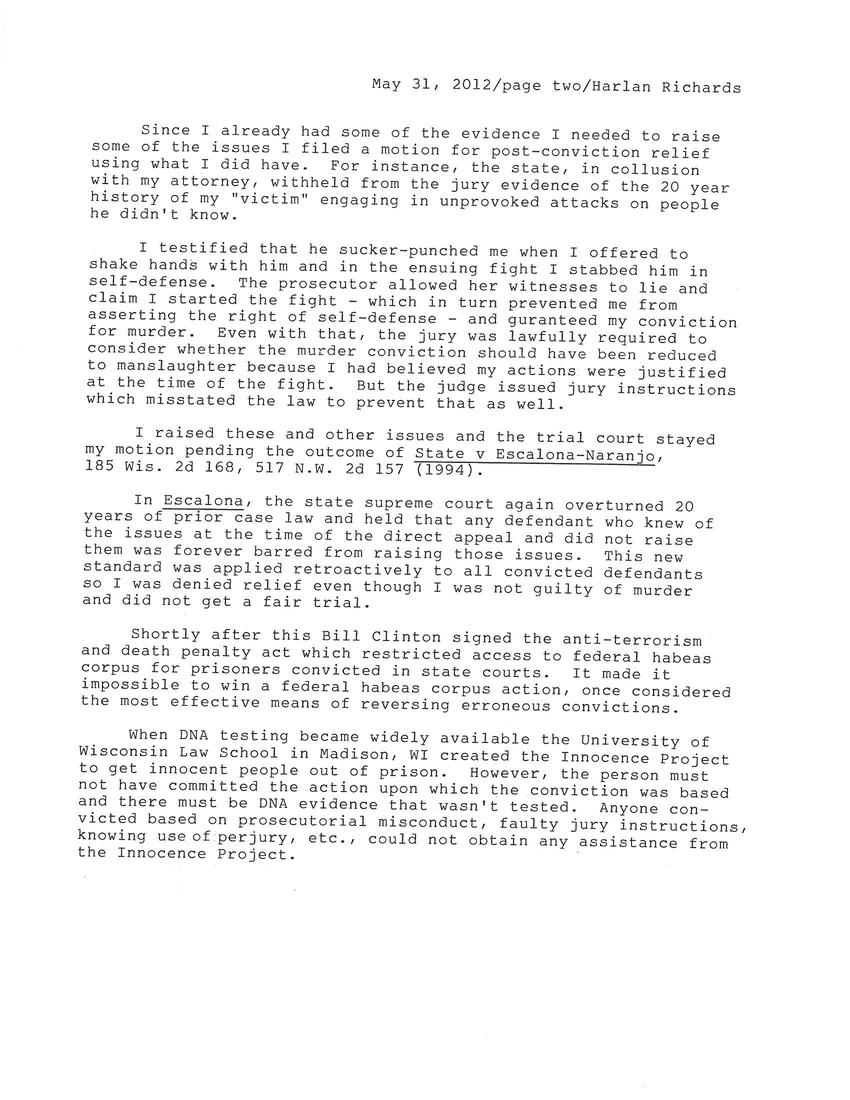
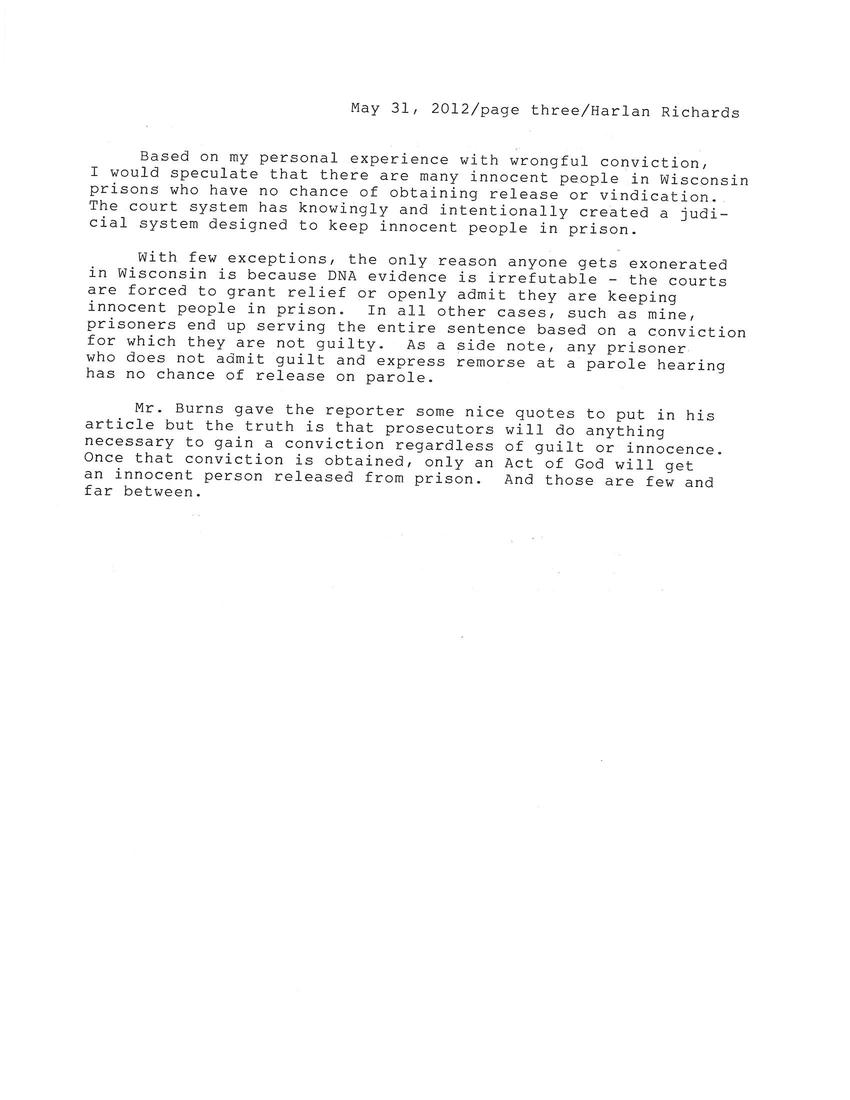

Replies (2)